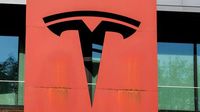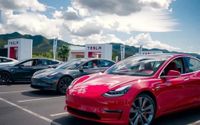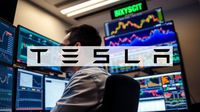Tesla's stock price is in free fall, with shares plummeting over six percent on April 21, 2025, due to disappointing delivery numbers and delays in launching a cheaper model. The stock closed below 200 Euros, marking a significant downturn for investors. Since the start of 2025, Tesla's stock has lost a staggering 40 percent of its value, raising alarms among analysts and shareholders alike.
The reasons behind this dramatic decline are multifaceted. Analysts have slashed their delivery expectations for the year from two million vehicles to approximately 1.65 million, a significant reduction that reflects growing concerns about the company's performance. Moreover, the anticipated rollout of a more affordable version of the Model Y, internally referred to as E41, has reportedly been put on hold, further dampening investor sentiment.
Wall Street analysts are sounding the alarm. Dan Ives from Wedbush described the situation as a "Code Red Situation," indicating that Tesla is facing severe brand damage due to CEO Elon Musk's political distractions and controversies. This could potentially cost the company 15 to 20 percent of its prospective buyers, according to Ives. With the quarterly earnings report scheduled for April 22, 2025, there is widespread skepticism about the company's ability to meet expectations.
Investors are particularly anxious about the upcoming quarterly figures, as margins are expected to come under pressure, possibly reaching their lowest point in years. In an effort to combat these challenges, Tesla has been offering incentives and discounts, but this strategy could negatively impact profitability.
On the same day, Tesla shares dropped about 6% in early trading to roughly $225, while broader U.S. markets also faced declines—with the Dow Jones falling by 454 points or 1.2%, the S&P 500 down by 1.4%, and the Nasdaq by 1.8%. The market's instability has left investors on edge, particularly in light of ongoing tariffs, protests, and concerns regarding how President Trump's trade policies might affect Tesla's business in China.
Adding to the pressure, Barclays recently lowered its price target for Tesla from $325 to $275, citing weaker vehicle deliveries and declining profit margins. Analyst Dan Levy characterized the current situation as "confusing," highlighting concerns about deteriorating fundamentals and a potential decline in gross margins due to lower sales volumes and production inefficiencies.
Despite the grim outlook, Levy noted that a strong narrative could offset weak fundamentals, especially if Musk indicates a renewed focus on Tesla and its core technologies, such as artificial intelligence and robotics. The introduction of the long-awaited affordable model is seen as crucial for attracting new buyers and reversing declining sales and shrinking market share.
As the day of the quarterly earnings report approaches, all eyes are on Tesla. Investors are eager to hear Musk's insights on the future, particularly regarding the timeline for autonomous driving and the much-discussed robotaxis. The forthcoming financial results are more than just a snapshot; they could serve as a pivotal moment for Tesla.
However, skepticism looms large. Analysts warn that if the company fails to exceed expectations, the stock could face further declines. The support level at $230 has already been tested multiple times, and a breach could see the stock plummet to $200.
Given the current landscape, investors are advised to proceed with caution. The upcoming earnings report could either provide much-needed clarity or exacerbate the already precarious situation. With Tesla's stock under significant pressure, the question remains: should investors buy or sell?
In summary, Tesla, founded in 2003 and headquartered in Austin, Texas, is currently the world's second-largest manufacturer of electric vehicles. The company also produces battery storage systems and solar installations, operating Gigafactories in the U.S., Germany, and China. As a member of the Nasdaq 100 and S&P 500 indices, Tesla's market value stands at approximately $876 billion, making its performance critical not just for shareholders, but for the electric vehicle market as a whole.







